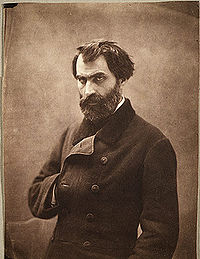
Eugène Pelletan
Encyclopedia

Born in Royan
Royan
Royan is a commune in the Charente-Maritime department, along the Atlantic Ocean, in southwestern France.A seaside resort, Royan is in the heart of an urban area estimated at 38,638 inhabitants, which makes it the fourth-largest conurbation in the department, after La Rochelle, Rochefort and Saintes...
, Charente-Maritime
Charente-Maritime
Charente-Maritime is a department on the west coast of France named after the Charente River.- History :Previously a part of Saintonge, Charente-Inférieure was one of the 83 original departments created during the French Revolution on 4 March 1790...
, Eugène Pelletan was an associate of Lamartine
Alphonse de Lamartine
Alphonse Marie Louis de Prat de Lamartine was a French writer, poet and politician who was instrumental in the foundation of the Second Republic.-Career:...
, but refused an appointment to the office in the foreign affairs ministry. He was elected deputy in 1863 and joined the opposition to the Second Empire
Second French Empire
The Second French Empire or French Empire was the Imperial Bonapartist regime of Napoleon III from 1852 to 1870, between the Second Republic and the Third Republic, in France.-Rule of Napoleon III:...
regime. His bright and eloquent speeches won him a fame of brilliant orator. Re-elected in 1869, he protested against the war with Prussia
Franco-Prussian War
The Franco-Prussian War or Franco-German War, often referred to in France as the 1870 War was a conflict between the Second French Empire and the Kingdom of Prussia. Prussia was aided by the North German Confederation, of which it was a member, and the South German states of Baden, Württemberg and...
and became member of the Government of National Defense
Government of National Defense
Le Gouvernement de la Défense Nationale, or The Government of National Defence, was the first Government of the Third Republic of France from September 4, 1870, to February 13, 1871, during the Franco-Prussian War, formed after the Emperor Louis Napoleon III was captured by the Prussian army. The...
on 4 September 1870. From 31 January to 4 February 1871, Pelletan exercised the duties of public education minister, but he departed for Bordeaux
Bordeaux
Bordeaux is a port city on the Garonne River in the Gironde department in southwestern France.The Bordeaux-Arcachon-Libourne metropolitan area, has a population of 1,010,000 and constitutes the sixth-largest urban area in France. It is the capital of the Aquitaine region, as well as the prefecture...
on 6 February.
Elected to the National Assembly
French National Assembly
The French National Assembly is the lower house of the bicameral Parliament of France under the Fifth Republic. The upper house is the Senate ....
in February 1871, he approved the politics of Thiers
Adolphe Thiers
Marie Joseph Louis Adolphe Thiers was a French politician and historian. was a prime minister under King Louis-Philippe of France. Following the overthrow of the Second Empire he again came to prominence as the French leader who suppressed the revolutionary Paris Commune of 1871...
and became vice-president of the Senate
French Senate
The Senate is the upper house of the Parliament of France, presided over by a president.The Senate enjoys less prominence than the lower house, the directly elected National Assembly; debates in the Senate tend to be less tense and generally enjoy less media coverage.-History:France's first...
in 1879. In 1884, he was elected senator for life
Senator for life
A senator for life is a member of the senate or equivalent upper chamber of a legislature who has life tenure. , 7 Italian Senators out of 322, 4 out of the 47 Burundian Senators and all members of the British House of Lords have lifetime tenure...
.
He was the father of Charles Camille Pelletan (1846–1915), French politician and journalist.

